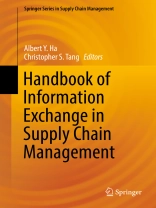Sharing accurate and timely supply and demand information throughout a supply chain can yield significant performance improvements to all members of the supply chain. Despite the benefits, many firms are reluctant to share information with their supply chain partners due to an unequal distribution of risks, costs, and benefits among the partners. Thus, incentive mechanisms must be in place to induce communication, cooperation, and collaboration among all members of a supply chain.
The issue of Information exchange/sharing has been examined by various researchers over the last 15-20 years. However, there is no research book that compiles various approaches, analyses, key implications, as well as future development of this area. This book will serve as a handbook for researchers who are interested in learning the state of the art of the line of research in this area and explore open research topics in this area.
Contributors, all leading researchers, have committed to delivering 18 chapters, broken into four distinct sections covering the Value of Information Sharing, Contracting and Information, Information Signaling, and Incentives for Information Sharing.
Jadual kandungan
Section 1 Value of Information Sharing.- Modeling and Measuring the Bullwhip Effect.- Empirical Studies in Information Sharing.- Collaborative Forecasting in Retail Supply Chains.- Section 2 Contracting and Information.- Reliability or Inventory? An Analysis of Performance-Based Contracts for Product Support Services.- Project Contracting Strategies for Managing Team Dynamics.- Time-Related Incentive Contracts for Managing Projects with Uncertain Completion Time.- Contracting for New Product Development.- Supply Disruptions and Procurement Contracting.- Contracting for Information Acquisition.- Section 3 Information Signaling and Cheap Talk.- A Tale of Two Information Asymmetries in Competitive Supply Chains.- Supply Chain Information Signaling and Capital Market.- Buying from the Babbling Retailer? The Impact of Availability Information on Customer Behavior.- Incentives for Forecast Information Sharing under Simple Pricing Mechanisms.- Section 4 Incentives for Information Sharing.- Establishing Trust and Trustworthiness for Supply Chain Information Sharing.- Information Leakage in Supply Chains.- Bilateral Information Sharing and Pricing Incentives in a Retail Channel.- Sharing Demand Information under Simple Wholesale Pricing.
Mengenai Pengarang
Albert Y. Ha is Wei Lun Foundation Professor of Business and Chair Professor at the Hong Kong University of Science and Technology. He has published in major academic journals in the areas of supply chain management, economics of queuing systems and production and inventory control. He currently serves as a Department Editor of Production and Operations Management as well as an Associate Editor of Management Science, Operations Research and Manufacturing and Service Operations Management.
He received his BSc in Civil Engineering from the University of Hong Kong, MBA from the Chinese University of Hong Kong and Ph D in Business from Stanford University.
Christopher Tang is UCLA Distinguished Professor and the Edward W. Carter Professor of Business Administration at the UCLA Anderson School. He is a renowned scholar in supply chain managementwho has published 5 books and over 100 research articles. Also, he is the recipient of numerous research awards including lifetime fellow awards of the Institute for Operations Research and Management Science (INFORMS), the Production and Operations Management Society (POMS), and the Society of Manufacturing and Service Operations Management (MSOM).
After completing his Presidency of the Production and Operations Management Society (POMS) in 2014, he now serves as Editor-in-Chief for the Manufacturing and Service Operations Management (M&SOM) journal. Chris received his BSc (First Class Hons.) from King’s College (London), M.A., MPhil, and Ph D from Yale University.












